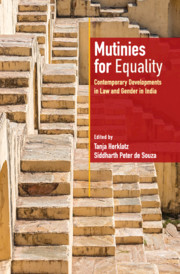10 - Interrogating the Freedoms of Queer Liberation in India
Published online by Cambridge University Press: 08 June 2021
Summary
Introduction
In September 2018, in the case of Navtej Singh Johar and Others v. Union of India (2018), the Supreme Court of India read down the infamous section 377 of the Indian Penal Code (IPC). This decision, which has been universally celebrated, rode on the back of a longer mobilisation against section 377. The judicial history of the movement to repeal 377 began in December 2001 when the Naz Foundation, a non-governmental organisation (NGO) concerned with the health of homosexual men, filed a public interest litigation (PIL) in the Delhi High Court, challenging the constitutionality of section 377 and the criminalisation of homosexual activity. While initially filed by the Naz Foundation, the case became a rallying point for the wider social mobilisation against 377 and was notably joined by Voices Against 377, an alliance of NGOs. The decision on this challenge was provided by the High Court in July 2009 when the two-judge bench read down 377, reasoning that treating consensual homosexual sex between adults as a crime is a violation of fundamental rights protected by India's Constitution. The jubilation was short-lived, however, given that this decision was later overturned by a two-judge bench of the Supreme Court of India in Suresh Kumar Koushal v. Naz Foundation. Following this setback, a writ petition was filed by five people, among whom was Navtej Singh Johar, in April 2016. Once again, this petition was joined by a wide gamut of NGOs who had mobilised against 377, and the case was eventually decided by a five-judge bench that included Chief Justice of India (CJI) Dipak Misra, Justice D. Y. Chandrachud, Justice R. F. Nariman, Justice Indu Malhotra and Justice A. M. Khanwilkar.
The decision, which once again clarified that consensual sexual relations between two members of the same sex could not be considered criminal, has been hailed as a step forward for LGBTIQ (lesbian, gay, bisexual, transgender, intersex and queer) rights. It has also garnered high praise for its reliance on the concept of constitutional morality, rather than social morality, and for offering a ray of hope to minoritised groups at a time when the health of the Indian democracy, almost never in the best of strength, is severely under threat from a majoritarian government that seems to be actively undermining the rule of law in the state.
- Type
- Chapter
- Information
- Mutinies for EqualityContemporary Developments in Law and Gender in India, pp. 185 - 203Publisher: Cambridge University PressPrint publication year: 2021
- 1
- Cited by



